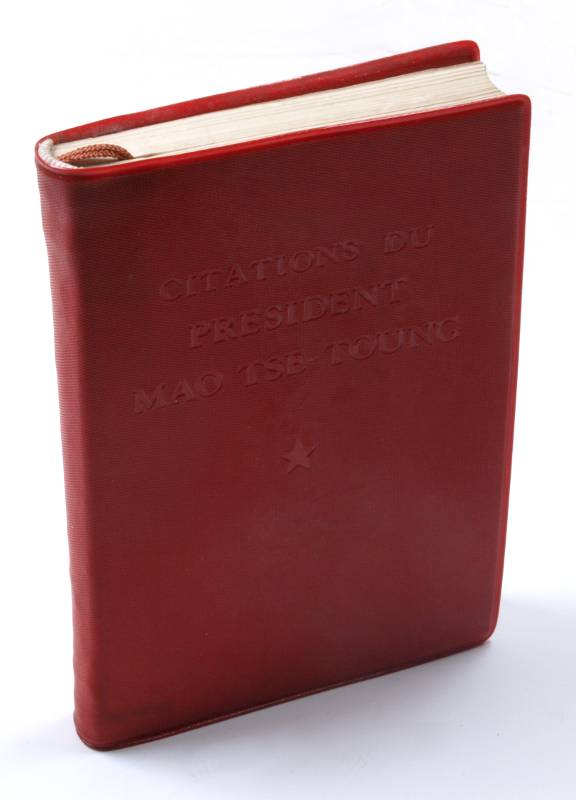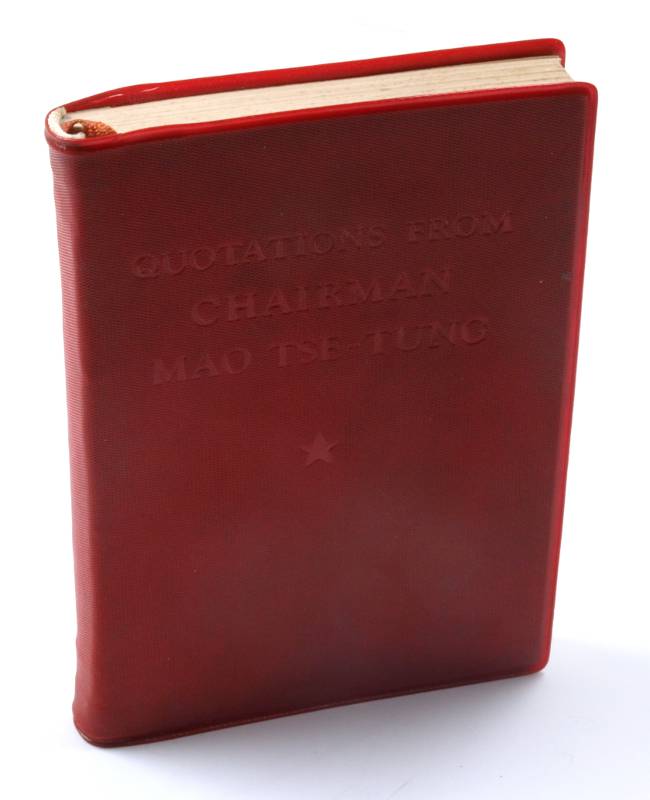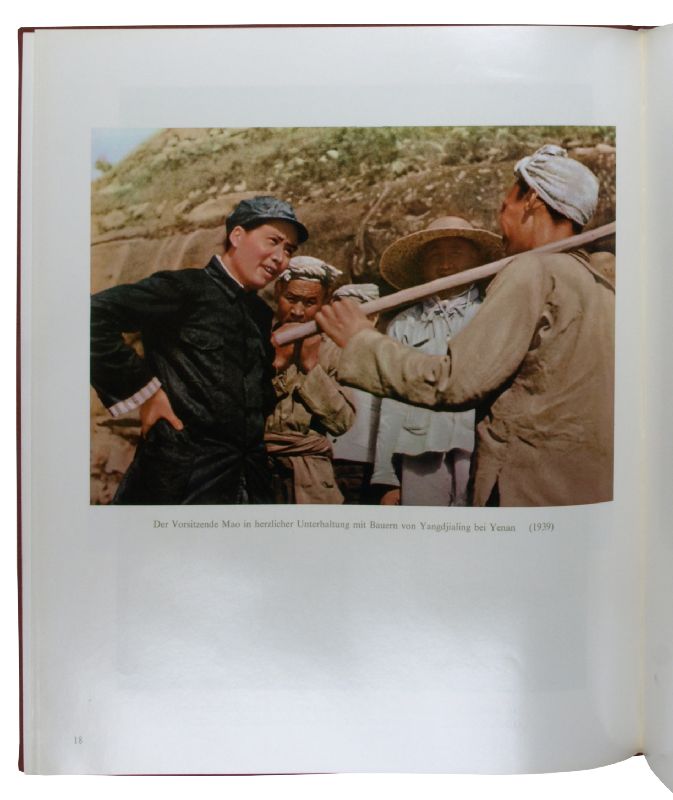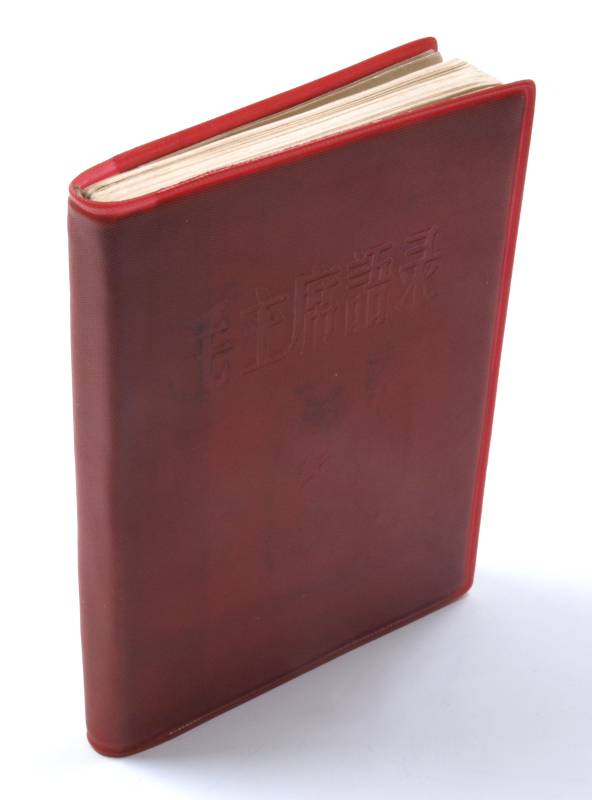
First edition in the original Chinese, first issue with the printing error on pages 82/83 (without erratum slip). The plate of Lin Biao's calligraphy has been torn (likely in 1972, after he fell from grace) and mended; similarly a large tear in the final page has been repaired, with slight loss to the text supplied from another edition. A few edge flaws; old ownership inscription in Chinese.
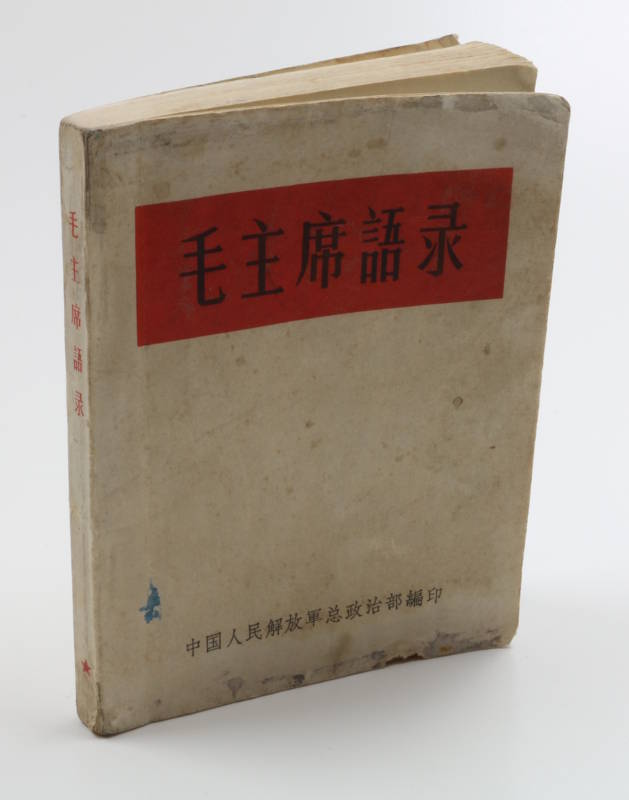
First edition in the original Chinese, second issue with the printing error on pages 82/83 corrected. Old Chinese ownership inscription ("Yul Feng") and additions to table of contents. A few edge flaws.
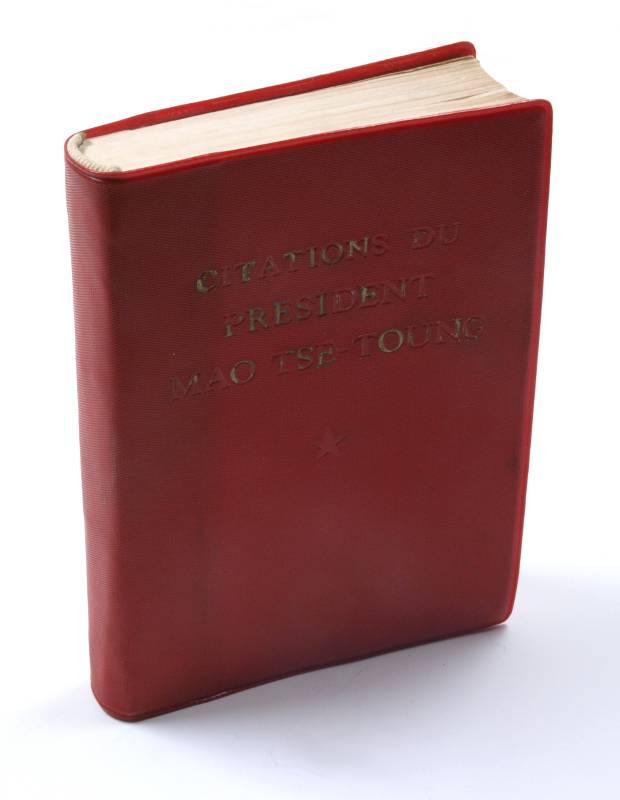
Second issue of the first French edition, with the extra endorsement by Lin Biao, dated 16 December 1966, prefaced. Some underlinings and annotations in blue ballpoint; slight waterstaining near end.
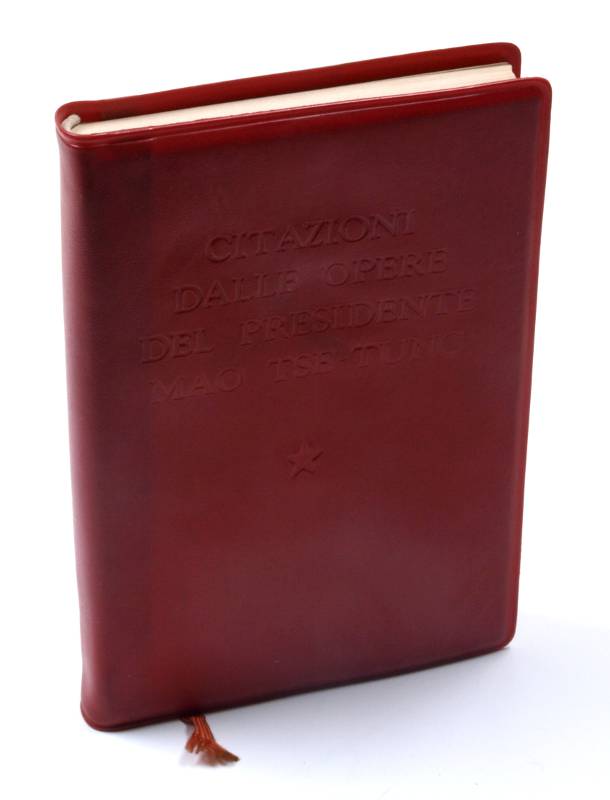
First Italian edition. Ownership "gruppo di studio e propaganda del Pensiero Di Mao Tsetung", "Via Palazzo dei Diavoli, 191 int., 50142 Firenze" stamped to flyleaf.

An exceptionally rare signature of Mao Zedong, signed during a diplomatic summit on 8 January 1963. The album also includes the signature of Chou Enlai (almost certainly on the same date) and 30 others: Indira Gandhi, Jawaharlal Nehru, Yasser Arafat (additionally inscribed "Revolution Till Victory"), Ne Win (Prime Minister of Burma), Khin Kyi (wife of Aung San), Bertrand Russell, Lord Mountbatten, Lester B. Pearson (Nobel Laureate and Prime Minister of Canada), statesmen and other public figures from Sri Lanka, Indonesia, Cambodia, and elsewhere.
The signatures in this album were collected by a member of the entourage of Sirimavo Bandaranaike (1916-2000), the world's first female Prime Minister, who served three terms as Prime Minister of Ceylon (now Sri Lanka). Many of the most significant signatures, including that of Mao, date from the period of the Colombo Conference ("Conference of six Afro-Asian non-aligned countries", December 1962), an attempt to ease tensions between India and China in the aftermath of the Sino-Indian War of 1962. Bandaranaike met Mao in China on January 7 and 8, 1963 in order to discuss the principles agreed in Colombo, following which she flew to New Delhi (Nehru's signature is dated 13 January 1963).
Occasional light soiling, but in all finely preserved. A remarkable survival.
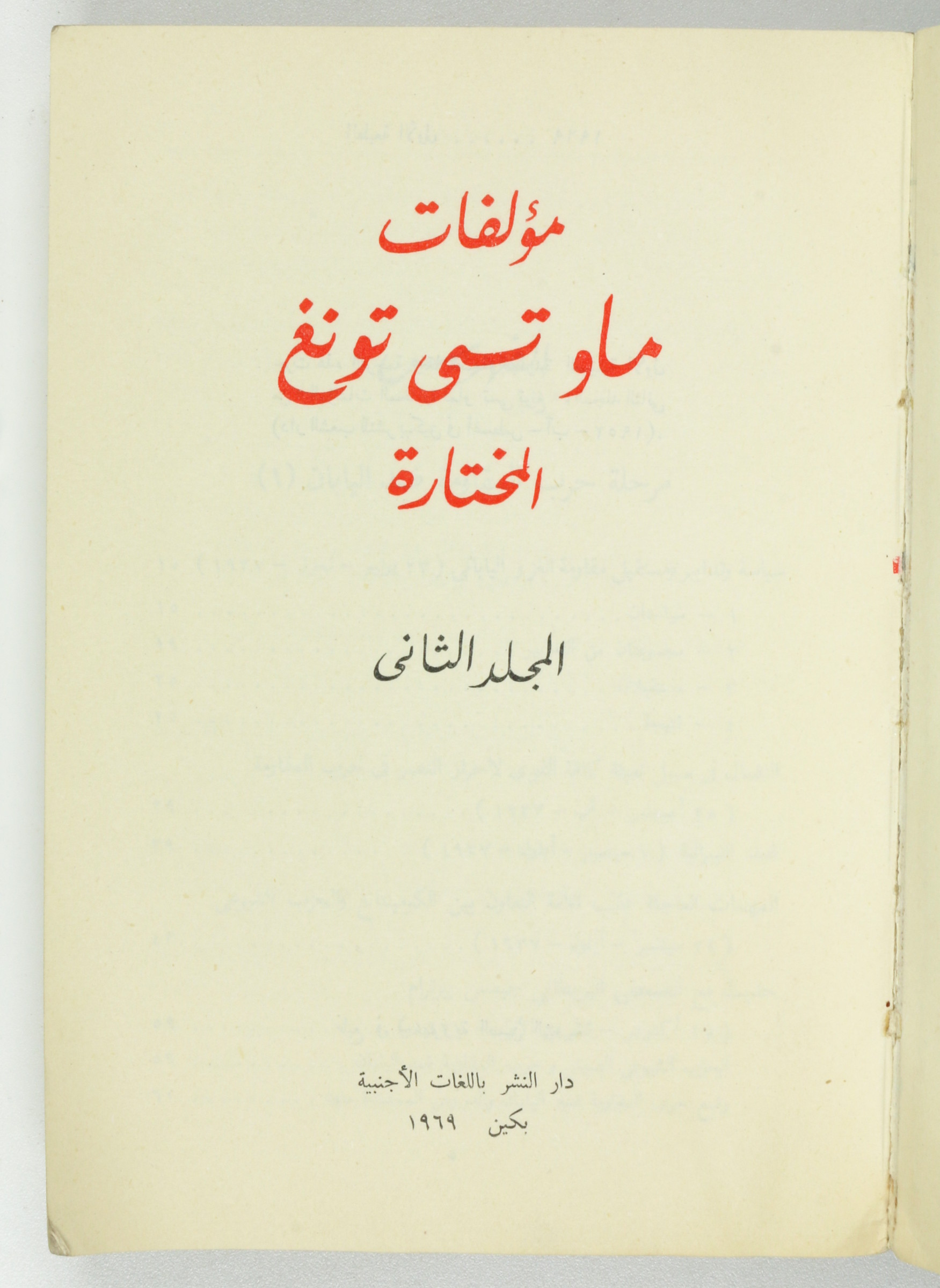
Early Arabic edition, covering "The Period of the War of Resistance Against Japan".
Binding slightly rubbed, lacking front wrapper (with slight waterstain to cardboard reinforcement), but interior well preserved.
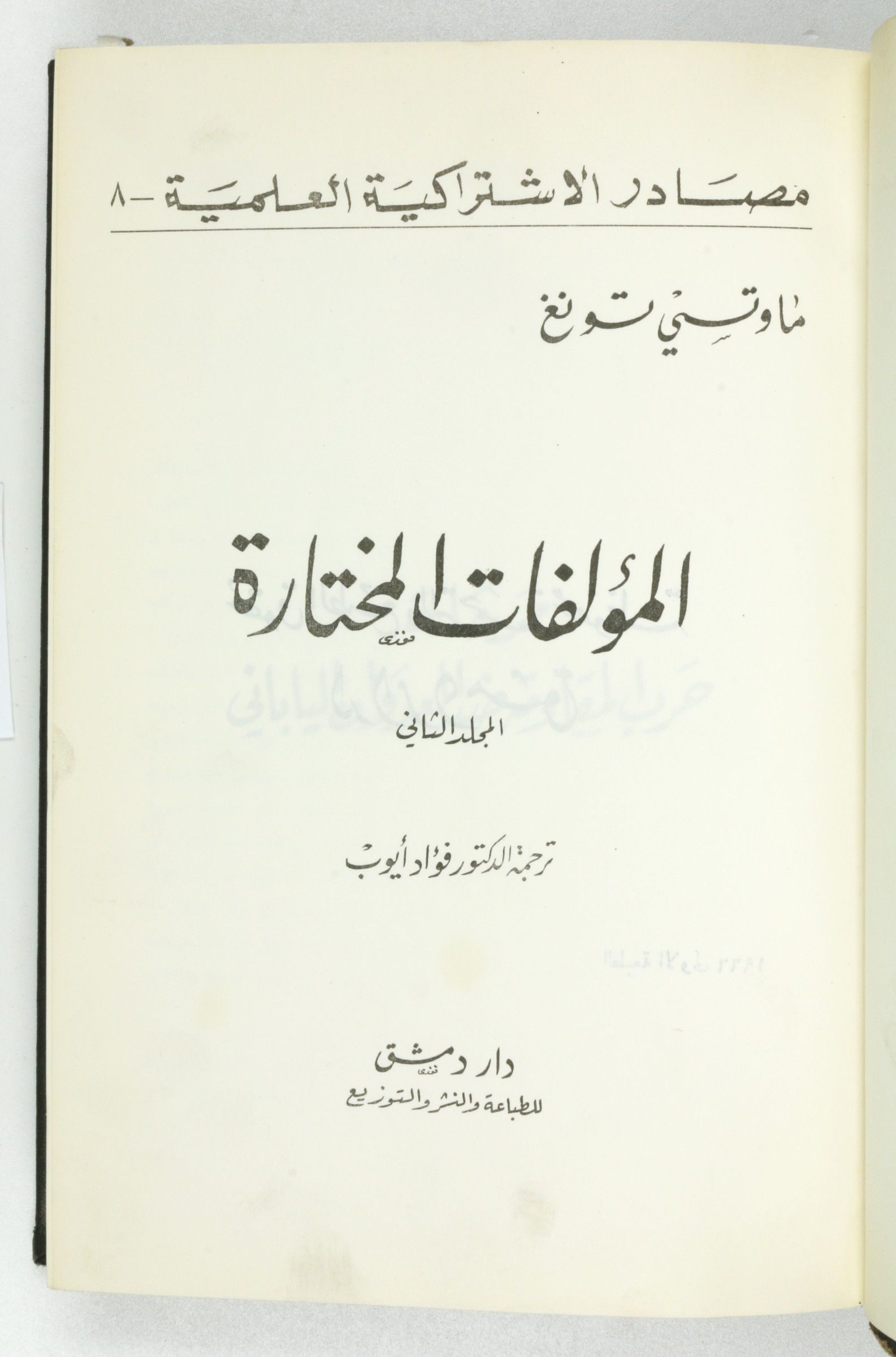
First Arabic edition, comprising vol. 2 ("The Period of the War of Resistance Against Japan") and vol. 4 ("The Third Revolutionary Civil War Period").
Bindings rubbed at extremeties, but interior well preserved.

A fine signature obtained during a 1960 Buffet Party in honour of Latin American communists, held at Beijing's Xinqiao Hotel and attended by Mao Zedong. The China-Latin America Friendship Association, who hosted the venue, was established in Beijing earlier that same year, in March 1960, and soon became the general fortress of cultural infiltration into Latin America. The U.S. diplomat Roy R. Rubottom Jr., who served as Assistant Secretary of State for Inter-American Affairs (1957-60), noted that, also in 1960, Mao Zedong appeared to have "gone out of his way" to receive Latin American Communist leaders and to exhort them to give their full backing to the kind of revolution he favoured. The following year, the Xinqiao Hotel would be the site of a major conference hosted by Zhou Enlai, who there encouraged intellectuals and cultural activists to start work again.
Following the end of World War II, the Communist movement was flourishing in Latin America, and as early as 1947 Mao Zedong was prompted to remark that "the Latin American peoples are not the obedient slaves of United States Imperialism". Chairman Mao and the Chinese communists' goal was the defeat of United States Imperialism, and Latin America was regarded as vital to attaining this goal, as it supported Mao Zedong’s theory of the establishment of rural revolutionary base areas. Chinese interest and activities in Latin America increased sharply in the early 1950s (there were believed to be 250,000 card-carrying communists active in the area), and the countries were of considerable interest to the Chinese and viewed as a fertile ground for advancing Communism, not least Red China's own brand of the ideology.
Some very light overall soiling to both sides, barely affecting the signature. An attractive example of one of the rarest and most sought-after autographs of all major political leaders and cultural icons of the 20th century.

First French edition, containing an extremely rare calligraphic inscription, brush-written by Mao Zedong in 1965 shortly before the Great Proletarian Cultural Revolution, to the foreign diplomat Charles Meyer (1923-2004). The French national Meyer spent 25 years in Indochina, including 15 years in Cambodia during the 1950s and 1960s, serving King (and later Head of State) Norodom Sihanouk as media and public affairs advisor. He formed part of the Sangkum government’s inner power circle and served as the author and editor of many official government publications. He also wrote several books on Cambodia, including the historical accounts "Behind the Khmer Smile" (Plon, 1971) and "The French in Indochina: 1860-1910" (Hachette, 1996). Meyer left the country in 1970 in the wake of the coup d’état and the advent of the Khmer Republic.
When in the early 1960s Prince Sihanouk came to recognize revolutionary China as Cambodia's most valuable ally, Meyer took part in several high-level meetings in Beijing and on the Yangtze River that the Prince held with Mao Zedong, Zhou Enlai, and Chairman Liu Shaoqi. He was present at the 1964 talks with Zhou Enlai to promote Khmero-Chinese friendship and a member of the Cambodian delegations in 1964 and 1965. It was on one of these diplomatic missions that Mao Zedong honoured Meyer by this exceptionally rare token of his esteem.
Finely preserved.
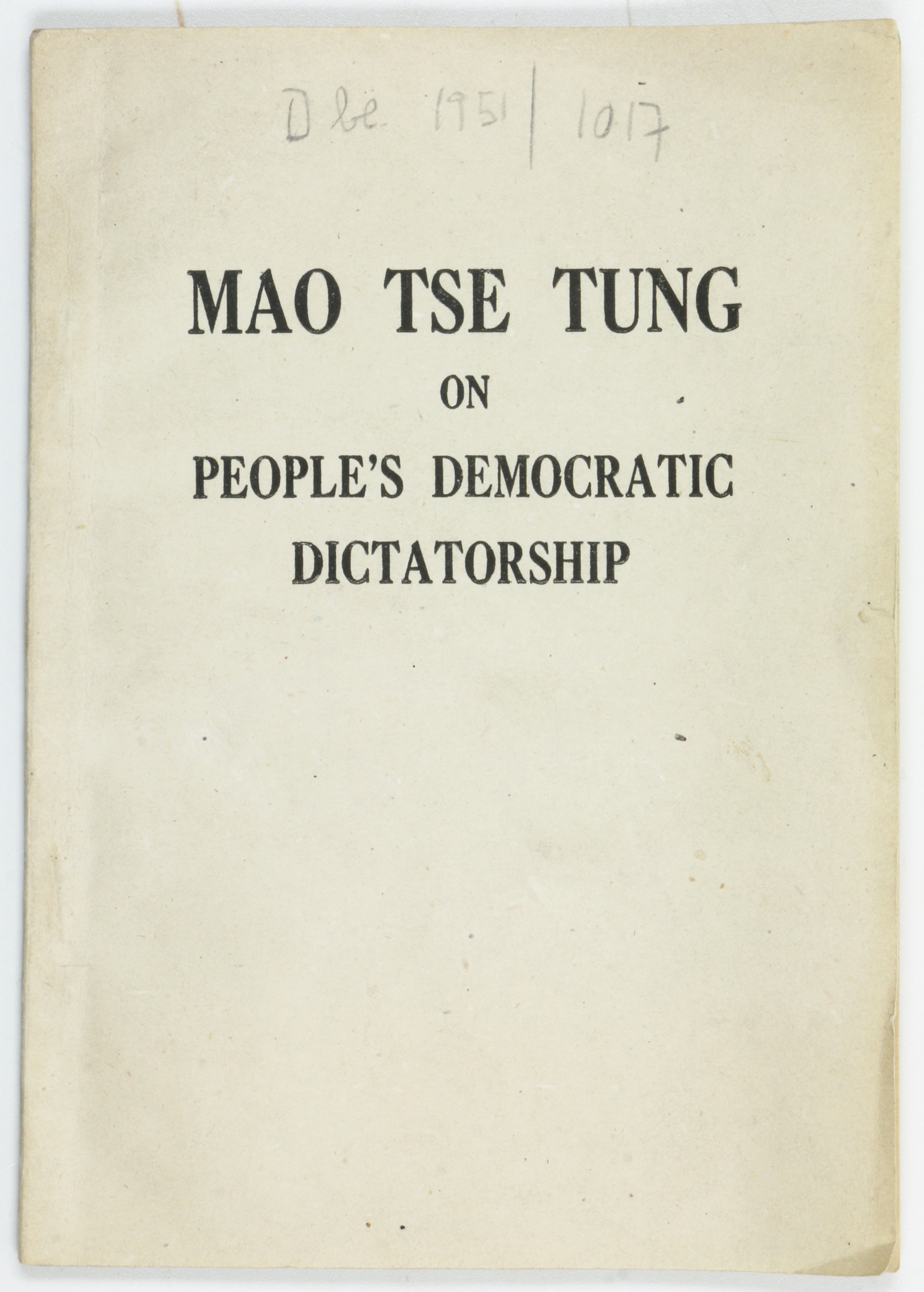
Second edition, rare.
Mao's remarkable pro-Russian essay in English translation. In this "seminal policy pronouncement" (Chau), Mao laid out the political, economical, and social direction for China. Preceding the freeze in Sino-Soviet relations, it advocates a close alliance with the Soviet Union against international capitalism as pursued by the United States. Prepared in 1949 on the occasion of the 28th anniversary of the founding of the Chinese Communist Party.
Mao vividly describes the early years of the Chinese communist revolution against Chiang Kai-shek, the leader of the Kuomintang, speaking of destroyed and crumbling imperialist empires. He claims victory for Chinese communism and welcomes former intellectual adversaries to "learn anew" and to warm to Marxism-Leninism. Further, he credits the CPC for raising the standards of the working class in China and for its strong alliance with the Soviet Union. Other than that, the essay addresses some aspects of criticism facing the Chinese party: leftist extremism and aggression, foreign relations, international communism, rejection of American and British aid, and cries of dictatorship.
In addition to this famous work, the booklet includes two shorter speeches Mao delivered at the preparatory committee meeting and at the first plenary session of the Chinese People's Political Consultative Conference in 1949.
Upper wrapper slightly warped; otherwise in excellent condition.
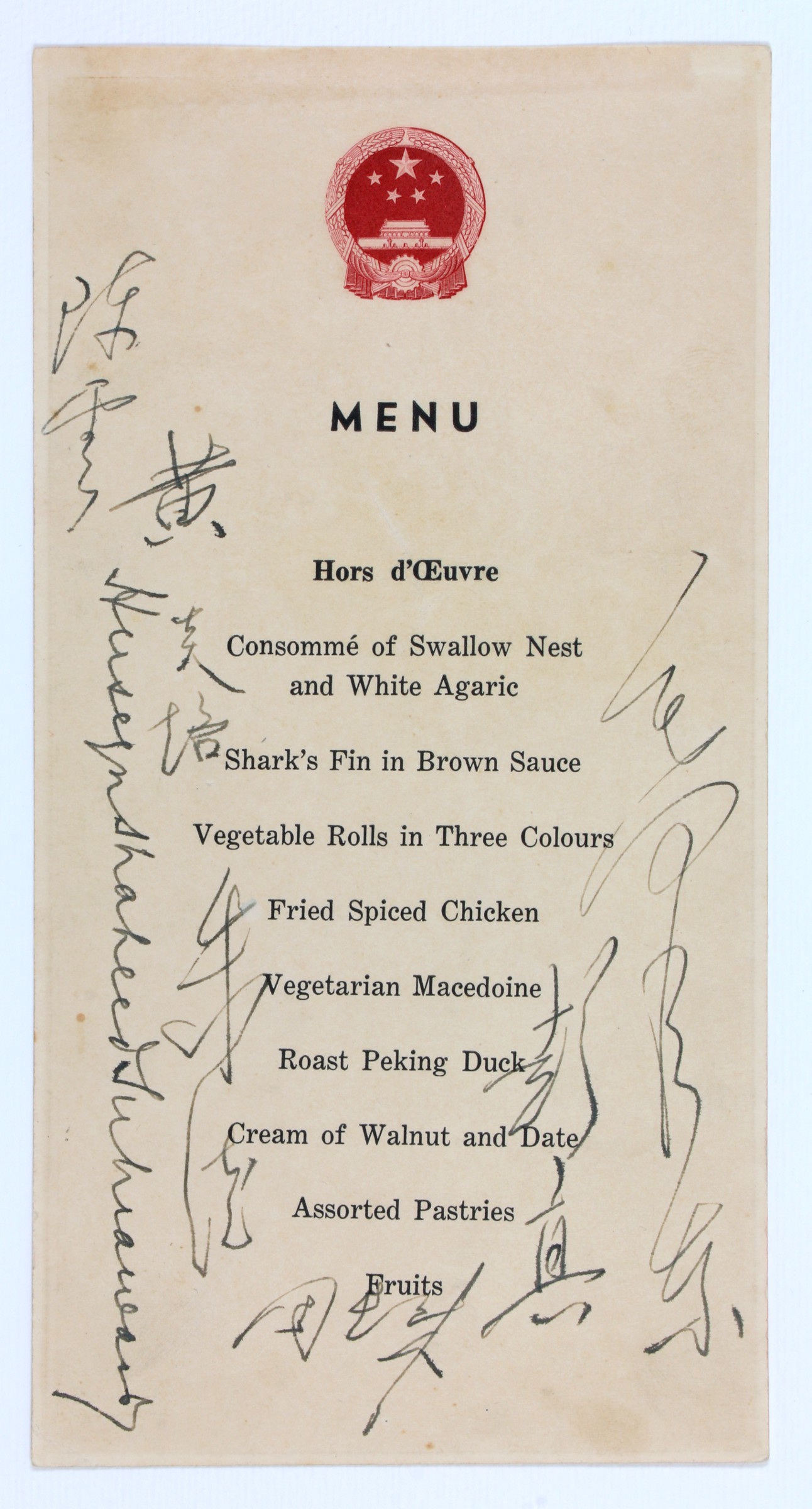
Menu card for the state banquet in honour of the Pakistani statesman Huseyn Shaheed Suhrawardy (1892-1963), who only a month earlier had become Prime Minister. The card is signed by Mao and Suhrawardy, as well as by five Chinese statesmen: Zhou Enlai (1898-1976, the official host and Premier of the PRC), Huang Yanpei (1878-1965, Vice Premier of the State Council and Minister of Industry since 1954), Peng Zhen (1902-97, Mayor of Beijing, deposed in 1966 but rehabilitated in 1979 and later Chairman of the National People's Congress), Chen Yun (1905-95, leading economic politician, Party Vice Chairman and later one of the major architects and important policy makers for the Chinese economic reform), and Zhu De (1886-1976, Vice Chairman of the Communist Party and of the PRC, long the Commander-in-Chief of the People's Liberation Army and Mao's military advisor since the 1930s).
During this first visit to China by a Pakistani Prime Minister, the delegations discussed matters such as the exchange of goods (coal for cotton) and industrial development, improvements in water management and the training of engineers. In his conversation with Suhrawardy, Zhou sought to dispel fears of Chinese hegemony: China herself, he pointed out, had suffered under Western colonialism and now wished to pursue industrial development in the spirit of peaceful co-existence with all countries, based on mutual respect. Zhou insisted to a skeptical Suhrawardy that the education of the current generation of Chinese political leaders would ensure that future generations would not commit war or aggression.
A little sunned showing very light traces of matting along the edges, otherwise flawless. Signatures by the "Great Chairman" Mao are extremely rare; an ensemble of signatures by several important figures of the first generation of leaders of the People's Republic is almost unprecedented in the trade.
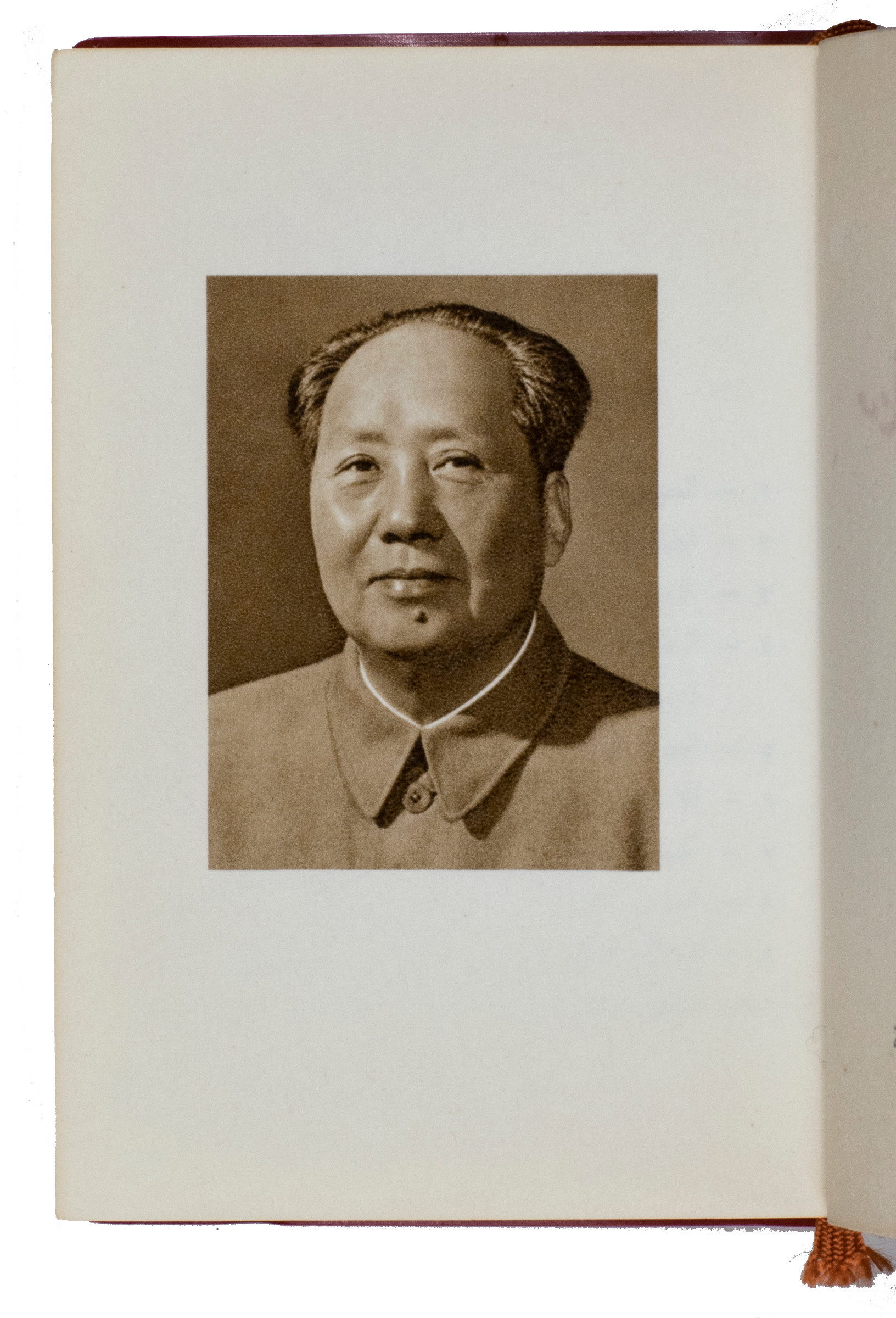
Arabic translation of the "Quotations from Chairman Mao Tse-tung", popularly known as the "Little Red Book". First compiled and published in 1964, by 1970 several billion copies were printed as every Chinese citizen was more or less obliged to own and carry a copy. After the book was approved for publication outside China in 1966, the Foreign Languages Press oversaw the translation and publication of the book into dozens of languages. The Arabic translation was first published in 1967 and printed not in China but in Egypt to influence the Pan-Arabist movement. According to an article in the Peking Review, China's official foreign newspaper: "The publication [...] was enthusiastically welcomed by the revolutionary Arab masses. Some of them began to read Chairman Mao's works on the street as soon as they bought them. [...] While working hard to print the Quotations, the workers at the printing house squeezed in time to study this treasured book of revolution" (Peking Review). The "Quotations" became the inspiration for the form, if not the contents, of Muammar Gaddafi's "Green Book".
With a stamp of the "Committee on New Alternatives in the Middle East" on the front endpaper and a faded Chinese stamp on the back endpaper; a very good copy.
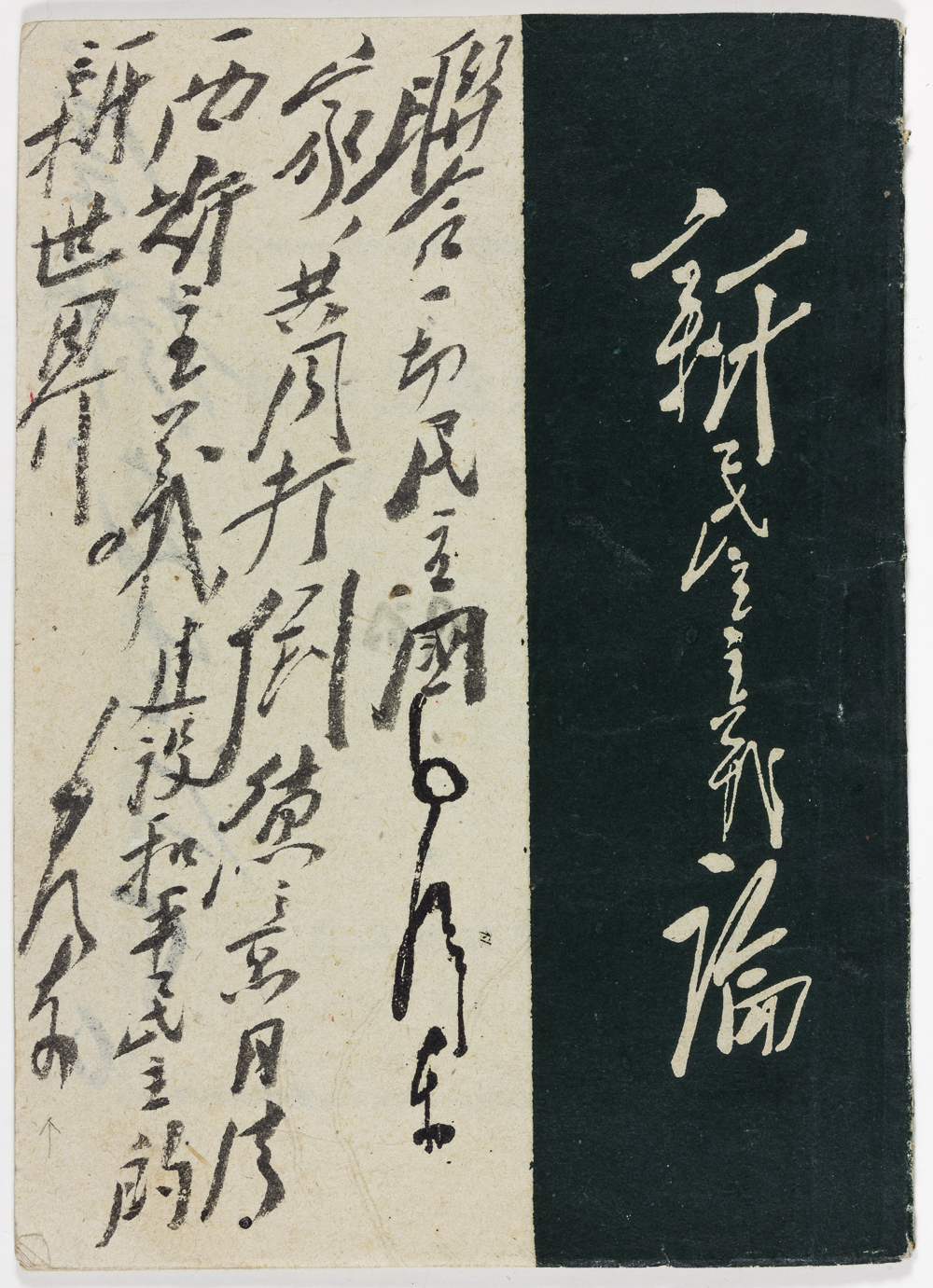
Of the utmost rarity: Mao's important work "On New Democracy" with an autograph inscription by Mao to a French aristocrat fleeing the invading Japanese. On the front cover and its inside, Mao dedicated the book in Chinese characters with a calligraphic brush, writing: "Let us unite with all democratic countries to conquer the Japanese-Italian-German fascism and to build a new world of peace and democracy. Mao Tse-Tung for Mr. d'Anjou". The "New Democracy" to which Mao refers in the title of this work, written in 1940, was fundamental to his political thought: it denotes the democracy brought about by the proletarian revolution, in contrast to the bourgeois revolution's "old democracy". The founding of the People's Republic of China in 1949 is considered the consummation of New Democracy.
Comte Rene-Charles d'Anjou (b. 1914), a descendant from French royalty, had fled westward from Japanese-occupied Beijing in 1942. During his eight-month flight, he met the forces of General Lin-Piao and soon became acquainted with Mao at the communists' headquarters in Yanan, where Mao invited the French journalist and his companion to dinner. D'Anjou wrote an account of his encounter with Mao which was published in several newspapers, and we include the photocopy of one such article ("Un déjeuner de campagne avec Mao") which appeared in the weekend edition of Le Figaro, 18/19 Sept. 1976, p. 2, further corroborating the authenticity of the inscribed book.
The present piece was originally sold at Stargardt in 1977 (sale 612, lot 1435), and we further include an original copy of the Stargardt catalogue. It was subsequently sold at Christie's in 1983 (16 Dec., lot 502) before being offered by the respected American autograph dealer Paul Richards (1939-93) in 1993. Since its sale by Richards, this piece has remained in a private European collection. Mao's signature is exceptionally rare, and as an example of this length and quality of content, it must be considered unique.




